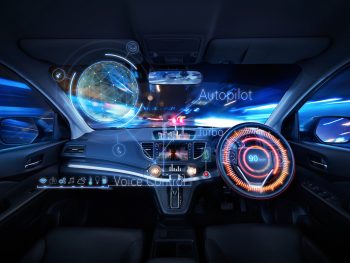Legal reform proposals to remove driver liability for self-driving car crashes
New proposals on UK legal reforms to provide clarity around driver responsibilities and liability for self-driving vehicles have been set out in a new report.

The report recommends the introduction of a new Automated Vehicles Act that would draw a clear distinction between features which just assist drivers, such as adaptive cruise control, and vehicles that are fully self-driving
Published by the Law Commissions, the report makes several recommendations to ensure the safe adoption of vehicles with self-driving capability, in particular introducing a new Automated Vehicles Act to regulate vehicles that can drive themselves. This would draw a clear distinction between features which just assist drivers, such as adaptive cruise control, and those that are self-driving.
For vehicles officially authorised as having ‘self-driving features’, the person in the driving seat – now known as a ‘user in charge’ – would no longer be responsible for how the car drives when such features are engaged.
Instead, the company or body that obtained the authorisation would face regulatory sanctions if anything went wrong.
This new system of legal accountability would bring the ‘user in charge’ immunity from a wide range of offences – from dangerous driving to exceeding the speed limit or running a red light. Data would show where fault and liability lay and would also allow car makers to identify where and how self-driving features could be improved to enhance future safety.
Importantly though, users in charge would still be responsible for non-automated processes, such as carrying insurance, checking loads or ensuring that children wear seat belts.
And they would still be required to take back control at any time when requested. If not, the vehicle would stop in lane on the motorway. Users would also not be able to sleep or use their mobile phones when the vehicle was in self-driving mode.
The reforms also propose some vehicles be authorised to drive themselves without anyone in the driver seat – enabling mobility solutions such as shuttle buses. In these cases, occupants would be classed as passengers and a licensed operator would be responsible for overseeing the journey. There would also be requirements for passenger services to be accessible, especially to older and disabled people.
Meanwhile, vehicles that have driver assistance features but are not fully autonomous would not be allowed to be marketed as self-driving, minimising the risk of collisions caused by drivers thinking that they don’t need to be in control.
The recommendations from the Law Commission of England and Wales and the Scottish Law Commission follow a number of consultations carried out in the UK and are intended to ensure safety and accountability while encouraging innovation and development.
The changes would build on the reforms introduced by the Automated and Electric Vehicles Act 2018, which ensured that victims who suffer injury or damage from a vehicle that was driving itself will not need to prove that anyone was at fault. Instead, the insurer will compensate the victim directly.
While the report has been laid before Parliament and the Scottish Parliament, it’s up to the UK, Scottish and Welsh Governments to decide whether to accept the Commissions’ recommendations and introduce legislation to bring them into effect.
Welcoming the recommendations, Transport Minister Trudy Harrison said that while the development of self-driving vehicles in the UK has the potential to revolutionise travel, it’s vital to ensure we have the right regulations in place, based upon safety and accountability, in order to build public confidence.
“That’s why the Department funded this independent report and I look forward to fully considering the recommendations and responding in due course,” she continued.
Thatcham Research, which was part of the consultation for the Law Commissions’ report comments, said the report was a significant step, in particular as the first innovations in self-driving features will start arriving on cars on UK roads in the next 12 months.
Matthew Avery, chief research strategy officer, said: “To ensure clarity around system capabilities and responsibilities there must be a clear separation between assisted driving, where the car supports the driver, and self-driving capability, where the car is responsible for the entire driving task. As such, we applaud the recommendations that compel carmakers to use appropriate terminology when marketing these systems, to prevent motorists from becoming convinced that their car is fully self-driving, when it is not.”
He added: “The Law Commissions recommend that there must be access to data to understand fault and liability when a crash does occur. This will ensure rapid and efficient compensation, and the data will also allow car makers to identify where and how self-driving features can be improved to enhance future safety.
“The insurance industry and the ABI have been working with the Law Commissions for several years. We look forward to continuing to work with car makers and the UK Government to ensure the safe deployment of vehicles with self-driving capability.”
To access the report, click here.












